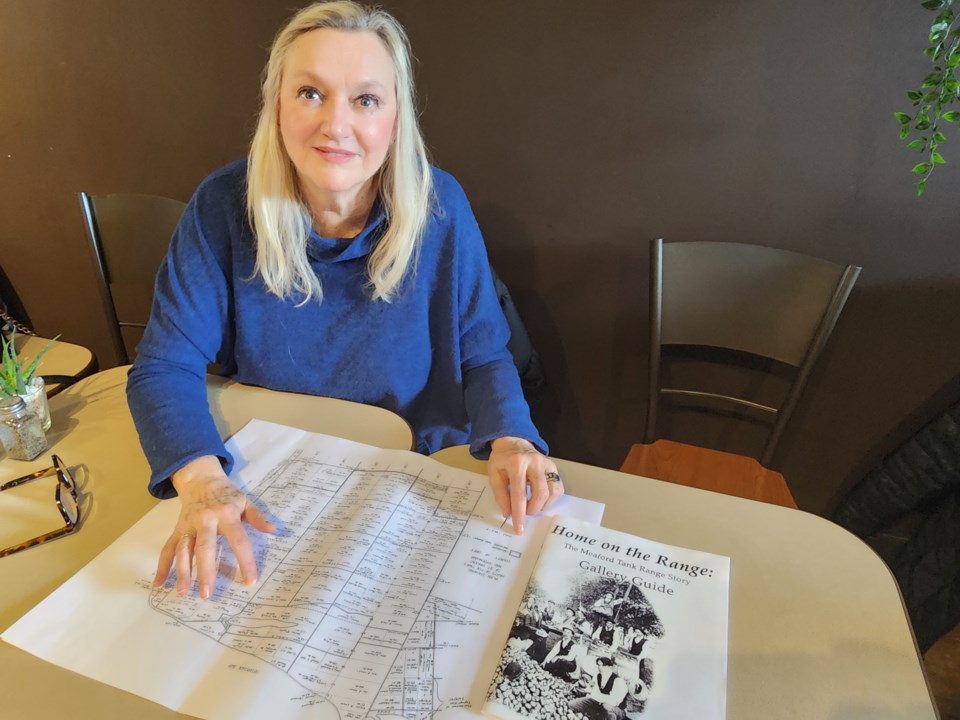The Blue Mountains author Paula Hope is working on a new book that will tell the stories of the families who lost their land and homes decades ago when a military base was created locally.
Hope, who is well-known to local residents in her role as a councillor for the Town of The Blue Mountains, has been researching the history of the military base in Meaford for several years.
The history of the base is well-known to long-time local residents. In 1942 during the Second World War, the federal government expropriated almost 20,000 acres of land in St. Vincent and Sydenham townships to establish a training centre to prepare soldiers to fight with armoured tanks and heavy equipment.
The land the government chose was not vacant. It were the home to hundreds of local families with their own communities, farms, schools, churches and cemeteries.
For Hope, the connection to the military base is personal. The homestead of her great grandparents – Mary Bell and Andrew Farquharson – was located just a concession away from the military base in Sydenham Township.
“As a kid, when I was eight years old, I remember helping my grandfather on his tractor and I heard the base and I heard these booms. I almost took it for granted,” said Hope.
In 2015, Hope said she attended a lecture at Meaford Hall about the history of the military base. When she viewed a map of the property, she realized just how close her family roots were to the property.
“They were a concession away. That’s how it started,” she said. “Nobody in my family talked about anything that happened to create the tank range.”
For several years, Hope has been researching the base, colloquially known as the “Tank Range”, but is officially called the 4th Division Training Centre, Meaford. The base continues to be active today training regular and reserve soldiers.
She plans to publish her book later this year through the Ginger Press. Hope wants to tell the stories of the families who lost their land when the federal government expropriated the property for the base.
Emotions still run high on the subject. Families lost their homes, their land, their orchards and were never able to return.
“Many tears were shed. I have met relatives of the families who lost their land. It was upsetting and devastating,” she said.
One of the most painful aspects of the history, Hope said, is the fact that the families who lost their lands were told they could return at the conclusion of the war.
“They were promised their lands back, when hostilities ended, things would go back to normal,” she said.
Hope would like to hear from relatives of the families that were impacted by the expropriation. She wants to hear their stories and talk about what those events meant to their families.
“I would love to hear from families. If they want to reach out, I’d be delighted to talk,” she said.
Hope can be reached directly via email at [email protected]
Her research on the subject has taken her to the Meaford Museum, Grey Roots and she hopes to visit the base itself to talk directly to the military officials working there. She has also spoken to local residents with strong roots and long backgrounds in the community.
“I’m treating it like a historian would,” she said.
Hope’s research on the topic has also taken her to Holland and given her a glimpse of how the sacrifice made by Meaford families had on the overall war effort. In Holland, she saw a photo of a Canadian tank covered with flowers from the grateful Dutch people. On the tank it said: 4th Canadian Division.
“In Holland, the Germans surrendered to a Canadian general,” she said. “The Dutch have never forgotten.”
Hope said she wants to tell the story about the emotional impact the expropriation had on local families, but also the tale of how their sacrifice had a real and true impact.
“I want to find a way for these people to be recognized,” she said. “There is the pain people suffered and all of their stories, but at the same time, it’s very important to share the real contribution they made.”
In 1941 when the military began the search for land on which to train tank operators, the war was going poorly for the Allies. The military had underestimated the importance of tank warfare in the conflict and the existing military bases in Canada were not sufficient for that type of training.
“There was no training cente for our boys. They would have been trained on a manual and the first time they drove a tank was in combat,” she said.
She also said with the military base in the news headlines today, as the proposed location for the TC pumped storage energy project, she said it’s more important than ever for this story to be told.
“I think it needs to get out there. I want to hear the stories of people who witnessed the expropriation and those who feel they were affected,” she said.


